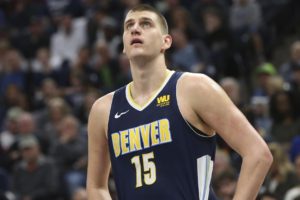Nikola Jokic his max Contract
Nikola Jokic Serbian Goat, will be worth every cent of his expected Max Contract to Denver Nugget scould have taken this offseason.
The first was to exercise Nikola Jokic’s $1.6 million qualifying offer, leaving them with about $12 million in cap room enough to perhaps inject some talent into a team that’s missed the playoffs for five straight years.
But going the qualifying offer route could have poisoned the relationship between the Nuggets and Jokic—who, you could argue, as one of the NBA’s premier big men, was the league’s most underpaid player last season—and allowed Jokic to become an unrestricted free agent in 2019.
This, no doubt, is why Nuggets president of basketball operations Tim Connelly elected to take path No. 2.
The Nuggets, according to multiple reports, officially declined Jokic’s team option earlier this week, making him a restricted free agent and paving the way for negotiations on a five-year max deal worth approximately $147 million. The deal cannot officially be signed until July 6 and will put Denver well over the luxury tax.
Or, to put this all in more simple, non-accounting terms: The Nuggets have now tied their fate to Jokic. All their success will be dependent on whether he lives up to his soon-to-come max-contract billing.
That the 23-year-old has arrived at this point is remarkable. It’s not often we see anonymous Serbian big men morph into All-NBA-worthy talents. That’s the thing about Jokic, though: Little about him is typical. And when it comes to his game, it’s his atypical skill set that makes this prospective max deal a wise bet for the Nuggets.
It’s not just that Jokic falls under the “unicorn” umbrella, meaning he’s a near 7-footer with a feathery jumper. These days, it seems like nearly every NBA team boasts one of those. Jokic’s brilliance is different, grander—at times, more subtle.
Take his seemingly supernatural ability to see every inch of the floor and sling pinpoint passes through the tiniest of creases. His capacity to dominate a game via the pass is Steve Nash-like if Nash were 6’10” and able to scan the court like a tall quarterback from in the pocket.
The numbers are ridiculous. Jokic dished 6.1 assists per game last season, which is a nearly unheard of number for big men. No center in NBA history has posted a greater assist rate than Jokic did last season, according to Basketball Reference. The only player who had the ball in his hands last year as frequently as Jokic and assisted on a greater percentage of his team’s baskets was LeBron James, per Cleaning the Glass.
In other words: Jokic has one of the most polished, diverse offensive games in the NBA. He’s exactly the kind of player you’d want to build an attack around: one who can fit in and makes others better, but also, when needed, he generates his own shot.
What’s interesting about Jokic, though, is he’s learned how to help stifle opposing offenses despite these constraints. Since he entered the league in 2015, the Nuggets defense has always been statistically better with him on the court. Last year they surrendered 5.2 fewer points per 100 possessions when he played, per Cleaning the Glass. They still bled corner threes and guarded at a below-average rate. But that the defense got significantly worse when Jokic sat is telling.
This wasn’t a statistical aberration, either. As outlined by Ben Falk, a former president of basketball strategy for the Sixers, now at Cleaning the Glass, Jokic does three things well that suppress opposing attacks. One is he doesn’t foul. Another is he’s adept, despite his lead feat, at cutting off opposing runs at the rim.
Jokic’s game is a prime example of the subtle tactics a player can wield to make up for deficiencies. This doesn’t mean his limitations won’t undercut the Nuggets in a playoff series, where an opponent would no doubt hunt him in pick-and-rolls. But that the Nuggets played like a 58-win team with him on the floor last season and just a 22-win one when he, per Cleaning the Glass, is sitting illustrates why the team is willing to bet its future on his continued rise.
The question the Nuggets have to confront is how best to go about constructing a supporting cast around their soon-to-be-minted franchise player. The Jokic extension, coupled with the four-year, $74 million deal they inked Gary Harris to last summer, limits their flexibility.
They’ll now rely on internal growth, from Harris—a 23-year-old three-and-D wing who looks like he could evolve—and Jamal Murray, the seventh overall pick in the 2017 draft who’s shown flashes of strong play in two NBA seasons and will also be up for an extension after this season.
In the present, a full season of Paul Millsap should help the Nuggets end their postseason drought. Millsap missed 44 contests last season with a wrist injury, and the Nuggets missed the playoffs by just one game. If he stays healthy, and neither Jokic nor Harris sustains serious injuries, then Denver should have no problem reaching the 50-win mark.
That’s what this Jokic extension does. It solidifies the Nuggets’ place as a perennial playoff contender for foreseeable future and gives them a foundation to build upon. Not every championship team can be built in July via free-agency pitches. Some take time and small steps.




